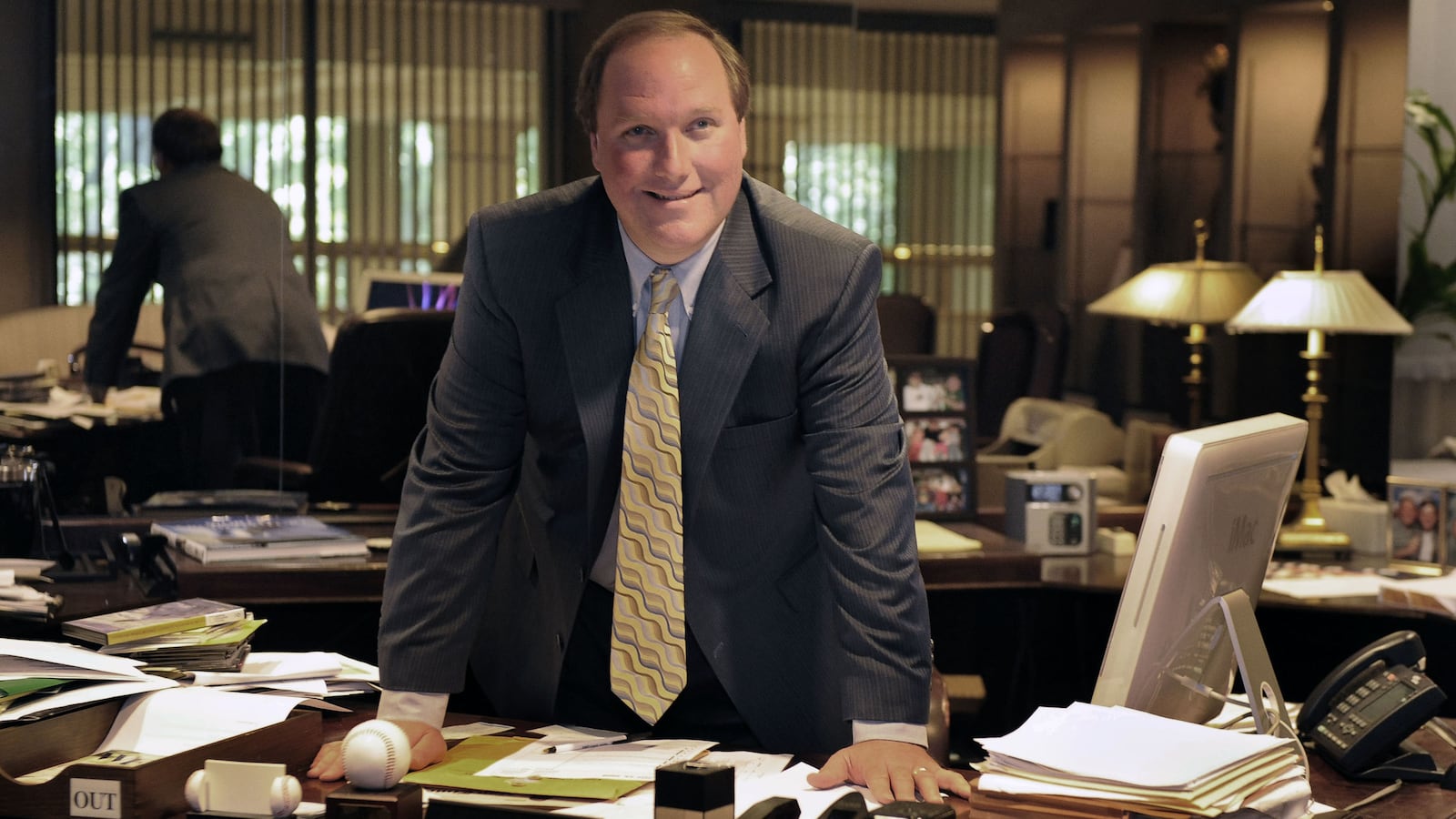Beltway-centric newspaper The Hill employs a team of dozens of journalists from a variety of backgrounds. But only one has managed to alienate many of his colleagues, fuel the paranoia of Fox News viewers, and inadvertently play a key role in the whistleblower complaint and President Donald Trump’s potential impeachment.
Over the past several years, John Solomon, a long-time journalist with bylines at the Washington Post, the Associated Press, and Newsweek/The Daily Beast, has pivoted to becoming the Trumpian right’s favorite “investigative reporter.”
And now, thanks to several mentions in the whistleblower’s complaint, his work has come under intense scrutiny following the revelation that a series of his stories about Ukraine, along with his Fox News appearances promoting them, may have led to the president asking Ukrainian President Volodymyr Zelensky to team up with Trump lawyer Rudy Giuliani to investigate the Biden family.
Over the past several months, and with the benefit of substantial airtime from Fox News primetime host Sean Hannity, Solomon has peddled a series of Ukraine-based conspiracy theories and allegations that have primarily taken aim at two of Trumpworld’s biggest targets: Biden and Hillary Clinton.
In the process, his questionable reporting, which often seems specifically tailored to stoke the flames of right-wing paranoia, has enraged many of his colleagues at The Hill who have for years seen his tactics and reporting as overtly ideological, convoluted, and often lacking in crucial context.
“He’s a lightning rod of anxiety for us,” one Hill insider told The Daily Beast.
Hired away from now-defunct news site Circa in 2017 to help launch The Hill’s over-the-top streaming service Hill TV, Solomon split his time between digital video strategy and running his own one-man conservative investigative unit, pumping out stories destined for Hannity’s show and—inevitably—the eyes of the president.
Before pivoting to Ukraine conspiracy theories, Solomon wrote a series of stories heavily suggesting the Department of Justice covered up a quid pro quo between Clinton and Russia during the approval of the Uranium One deal—a debunked scandal that nevertheless provided ammo for Trumpworld’s long-running narrative that the “real Russia scandal” centered on Clinton and the Obama administration. He also published an “exclusive” story saying that several women who accused Trump of sexual harassment sought payments from tabloid news outlets for exclusive rights to their stories as well as financial support from partisan donors.
While both questionable-at-best stories received the usual conservative media plaudits, Solomon’s reporting rankled colleagues and reportedly caused consternation among Hill middle management.
The Washington Post reported that more than a dozen staffers wrote a memo specifically criticizing Solomon’s handling of the story about Trump’s alleged harassment victims, which they said omitted the important context that seeking donor support is neither a new practice nor is it unique to one political party. The staffers also expressed dismay about other stories, including the Uranium One deal, and noted that Solomon’s work often negatively colored the way some important sources viewed engaging with The Hill.
“I am disturbed that a reporter at a purportedly non-partisan publication is pumping out pieces that appear to be heavily slanted towards one side of the ideological spectrum, and I am especially disturbed that these stories appear to be repeatedly leaked to a close informal adviser of President Trump (Sean Hannity) ahead of their publication,” one staffer wrote, according to a copy of the 2018 memo obtained this week by The Daily Beast. “It is difficult to see myself having a future at this company if it continues to prioritize heavily-slanted reporting that appears to be designed to curry favor with one side of the aisle.”
As a result of the memo, Hill management tried to simultaneously assuage internal concerns and tamp down any perception of internal strife. Editors eventually sent around a social-media policy memo unsubtly warning staffers against publicly criticizing colleagues or talking about internal matters to outside media.
But the company also tried in earnest to quell tension in the ranks, instituting a parental leave program—which staff had been seeking for months—and, in a victory for the paper’s reporting staff, labeling Solomon’s stories as “opinion” pieces. (Hannity, of course, has continued to hype Solomon as an “investigative reporter,” despite The Hill’s clarification.)
And yet even with his own employer openly downplaying the “reporting” aspect of his work, Solomon emerged this year as a key figure in jump-starting Team Trump’s Ukraine-Biden narrative that may now lead to impeachment.
In Solomon’s March 20 interview with Yuriy Lutsenko, the then-Ukrainian prosecutor general made a series of wild claims, including accusing Biden of pressuring the then-Ukrainian president in 2016 to fire the country’s top prosecutor—at the time, Viktor Shokin—to squash an investigation into a Ukrainian gas company connected to Hunter Biden. (Lutsenko would later retract some of the claims made to Solomon, eventually walking back his claims of wrongdoing by the Bidens, ultimately concluding: “Hunter Biden did not violate any Ukrainian laws.”)
This specific interview with Solomon was featured in a U.S. government whistleblower’s complaint as one of the key circumstances that eventually led to Trump’s now-infamous request on a July 25 call with the Ukrainian president. Solomon also promoted the interview and its unfounded claims on Hannity’s show later that evening, prompting an approving tweet from the president.
Giuliani, meanwhile, had already met with Lutsenko twice by the time of the interview, in January and February 2019, according to the complaint. And following his Lutsenko chat, Solomon published a piece on April 1 claiming the investigation into the Biden-connected energy company had been revived—“Joe Biden’s 2020 Ukrainian nightmare,” as Solomon blared.
That article, too, was referenced in the whistleblower’s complaint.
Besides reporting that Shokin claimed he “had made specific plans” to investigate the company’s board, “including Hunter Biden,” Solomon claimed that part of the probe was “reopened in 2018” and Lutsenko was now looking to share information with U.S. Attorney General William Barr.
Following the piece, Hannity and several of his Fox News colleagues ran wild with the story, with multiple on-air segments on it over the following days, including an April 3 broadcast in which Hannity declared that Solomon had caught Biden in an “international corruption scandal.”
And on the same day that Biden officially launched his presidential campaign, Hannity interviewed both Solomon and President Trump on his program. During that April 25 broadcast, Hannity cited Solomon’s reporting to claim Ukraine had evidence that Biden was “bragging about having gotten [the prosecutor] fired using American money” while Solomon said the prosecutor was actively investigating the junior Biden at the time. (The investigation into Burisma, the energy company, had long been dormant.)
Trump, meanwhile, said that Lutsenko’s “incredible” and “big” allegations laid out by Solomon—that Ukrainian officials leaked information on Paul Manafort to help Clinton—was something he “would imagine” Barr would want to look into. This was also highlighted in the whistleblower’s complaint.
Solomon’s connection to the Ukraine scandal re-opened old wounds at The Hill, particularly among staffers who have long been troubled by Solomon’s reporting.
Following the Thursday release of the whistleblower’s complaint, many staffers privately grumbled about the fact that, although Solomon’s pieces were now edited by the site’s opinion editor, they were styled after regular news stories and were also occasionally reviewed by top news editors before they went live.
Earlier this month, Solomon announced that he will leave The Hill to create his own start-up media firm. In an email to staff obtained by The Daily Beast, he seemed to attempt to quash any suggestion that his departure was related to his reporting problems, saying that he had agreed with Hill CEO Jimmy Finkelstein months ago that he would depart but stay on as a consultant for Hill TV.
In a statement, a Hill spokesperson relayed that “Mr. Finkelstein says John Solomon’s has done excellent work for The Hill and wishes him success with his new media venture.”
And despite Solomon’s imminent exit, several Hill insiders told The Daily Beast that some staffers have discussed whether they should raise the Ukraine issue to management, or even issue a public response, noting how the whistleblower complaint had brought negative attention to the company and its reporters.
“This is the most press Hill TV has gotten,” one staffer quipped, expressing exasperation with Solomon.
On Thursday afternoon, Solomon responded on Twitter to being named in the whistleblower’s complaint, saying he stands “100 percent” by his “completely accurate and transparent” stories.
“So I'm fast at work writing my next column and will strive to make it as accurate and transparent as my past work,” he added. “As that work documented, the people and leaders of Ukraine have been trying to send a loud message to America about the conduct of our government.”
Solomon appeared on Hannity’s show on Thursday night to promote his latest piece for the outlet he will soon leave. (The article was essentially a recap of his previous columns packaged as a brand-new bombshell on the Biden-Ukraine ties.)
Somewhat acknowledging his omnipresence throughout the complaint, Solomon defended his work to Hannity’s viewers, claiming he’d gathered hundreds of pages of “once-secret memos” over the past 18 months that put Biden’s story in doubt, calling on the ex-veep to put out his own documents to challenge his work.
“Where are Joe Biden’s documents? Let’s put forth the proof that they really thought this guy had the evidence—he has not done that.”







